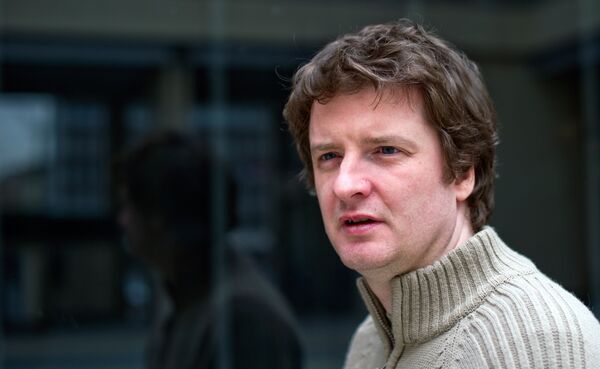I’ve been spending the short May holidays here in the Moscow countryside, but took an elektrichka – an electric suburban train - back into the capital this morning. As the elektrichka pulled out, I hit play on my MP3 player and the sounds of Soviet-era rock group Kino’s ode to this humble mode of transportation kicked in.
“I went to bed too late last night and got up too early today / I hardly slept at all/ I probably should have gone to the doctor’s this morning/ but now the elektrichka is taking me where I don’t want to go,” intoned late Kino vocalist Viktor Tsoi, his lyrics matching perfectly the faces of the dozing commuters all around me.
Russia’s elektrichkas, unlike the bright, new, all-mod-con equipped trains which take tourists to and from Moscow’s international airports, have remained virtually unchanged for years. Cheap, lacking toilets and as Tsoi also noted in his eponymous paean “cold, but at the same time warm,” the elektrichka is, if you are interested in searching for that kind of thing, a slice of “real Russia.”
If you don’t doze the whole journey, as I did this morning, people-watching is a great way to pass the time on an elektrichka. Fare-dodgers, Russians slang for whom is, oddly enough, “hares,” are involved in a constant battle the ticket inspectors, running from carriage to carriage in an attempt to stay one step ahead of officialdom.
To Russia’s eternal credit, fare-dodging just isn’t that serious an offense here (unlike in the West, where it can lead to court appearances and a criminal record), and there is an element of play involved in the bid to save a few rubles, as the “hares” hop from door to door, one eye open for their nemesis, the conductor.
In fact, fare-dodging on an elektrichka is apparently so easy, that some folk even travel across the country in this manner. I have acquaintances who have made the 700 or so kilometer journey from St. Petersburg to Moscow on dozens of elektrichkas in a frenzy of free-loading, route-studying ingenuity. It’s not too comfortable, of course, and you tend not to get too much sleep, but it’s free.
The elektrichka is also notable for its almost constant procession of salespeople, hawking goods that range from digital maps of Moscow to kettles to children’s toys to air-to-surface missiles (well, maybe not the last one).
And if the hares and offerers of essentials goods don’t entertain you, there are always the buskers. There was no musical accompaniment on my journey this morning, but the last trip I took on an elektrichka I saw a performance by a group made up entirely of army veterans singing about friendship, battles and the bittersweet taste of military victory.
My morning train was pretty packed, but a mid-afternoon elektrichka in the summer heat is a thing of joy, as families returning or heading to their dachas feast on rolls, sausages, dried fish, the train taking on the appearance of a rolling picnic.
And the smell of certain Soviet-era elektrichkas was noted by President-elect Vladimir Putin recently during a debate with a Communist lawmaker over the agrarian sector.
“We had lots of cows, but too little meat in the Soviet Union,” Putin said, in a rare put-down of the Soviet system. “You probably remember the joke, ‘what’s long, green and smells of meat?’”
The answer, as Putin revealed, was an elektrichka heading out of Moscow, carrying residents of suburban towns who had rushed into the capital to stock up on meat unavailable elsewhere.
And if you get bored of people-watching, Russian speakers will enjoy studying the names of the stations the elektrichka chugs through. My journey this morning took me past stations named “Tolstopaltsevo – Fat Finger” and “Pobeda – Victory.” There are also stations with far less prosaic names – such as 112 km – that simply indicate the distance from Moscow.
Eventually, my elektrichka pulled into Moscow. The fare-dodgers went off to try and overcome their last obstacle to a free journey – the turnstiles that block the entrance to the capital. The commuters (and the fare-dodgers among them), tramped off to where they didn’t want to go, and I made my way home to feed my cat.
The views expressed in this article are the author's and do not necessarily represent those of RIA Novosti.
*
From lurid tales of oligarch excess to scare stories about Moscow’s stranglehold on Europe’s energy supplies, the land that gave us Roman Abramovich and Vladimir Putin is very rarely out of the news. But there is much more to modern Russia than billionaire tycoons and political conspiracy. Marc Bennetts’ weekly column, Deeper Than Oil, goes beyond the headlines to explore the hidden sides of the world’s largest, and often strangest, country.
Marc Bennetts is a journalist who has written about Russian spies, Chechen football and Soviet psychics for a number of UK newspapers, including The Guardian and The Times. He is also the author of Football Dynamo: Modern Russia and the People’s Game (Virgin Books).
Deeper Than Oil: Priests, the Lot of Them
Deeper Than Oil: The Sad Tale of Dmitry Butakov
Deeper Than Oil: Reflections on Russia over a Pasty
Deeper Than Oil: Russia’s scandal-loving Communists
Deeper Than Oil: Russia’s Tales of Terror
Deeper Than Oil: A Short Guide to Russian and Soviet Cartoons
Deeper Than Oil: A History of Russia in Plastic Bags
Deeper Than Oil: He Who Sobs With Joy
Deeper Than Oil: The Return of Russia’s Savior
Deeper Than Oil: A Day Out at an Iranian Nuclear Reactor
Deeper Than Oil: Odd Times in Tehran
Deeper Than Oil: Chilling Choice for Russia’s Protesters



